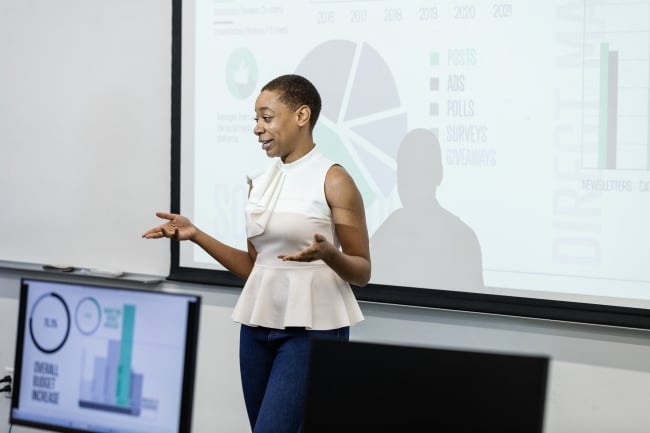You have /5 articles left.
Sign up for a free account or log in.

Many states and colleges are looking to remove or reimagine developmental education courses. Successful implementation of this work requires buy-in and support from faculty members.
SDI Productions/E+/Getty Images
In recent years, more colleges and universities have considered how non-credit-bearing English and math courses can be a barrier to completion or transfer for students and then imagined new ways to deliver college-level courses.
In June, FutureEd released a report with recommendations for colleges and universities on how to reform developmental education for students and some of the barriers to change. One hurdle is honoring faculty independence and autonomy in the classroom while implementing institution- or systemwide reform among courses.
In a Sept. 17 webinar hosted by FutureEd, experts discussed ways to engage and support faculty members in reforming remedial education.
“The next phase of reform should prioritize sustained and concerted efforts to engage, persuade and accommodate faculty,” according to Future Ed’s report. “After all, it is faculty who will deliver the changes in structure and curriculum that reform demands.”
The background: A 2012 report from Complete College America found nearly four in 10 remedial students in community colleges never complete their remedial courses, and fewer than one in 10 will graduate within three years.
In the past decade, more states have reimagined or done away with non-credit-bearing courses to promote equity and improve learning and completion among students. However, progress among developmental education has stalled in recent years, with a lack of data about these students nationally and little movement, according to FutureEd’s report.
Remedial education has gained renewed attention as the effects of remote instruction due to the COVID-19 pandemic’s effects have grown more visible among incoming college students. A recent EAB report highlighted declining reading proficiency and math scores among elementary and middle school students, as well as incoming first-year college students.
However, the success of developmental ed reform requires the attention and talents of administrators and faculty members. Professors typically have independence and autonomy in their classrooms, so implementing change at scale requires investment in those relationships.
Working together: To produce institutional change for student success, higher education leaders can communicate strategically with faculty members about remedial education.
- Busting myths. Reforming developmental education often comes with pushback because stakeholders incorrectly assume modifying courses or course sequences removes rigor. “Any student can pass college algebra, but there’s no reason they should,” said Amy Getz, senior program associate at WestED, referencing math pathways that allow students to select between statistics or algebra. Reinforcing an asset-based mindset around students in corequisite or alternative math pathways can improve student outcomes.
- Emphasizing data. One way to get faculty buy-in and ensure developmental education reform is faculty-driven is by providing relevant data on the issue, said Michael Itzkowitz, founder and president of the HEA Group, in the webinar.
- Focusing on skills. While ensuring students pass difficult gateway courses can help boost their chances of earning a credential or degree, learners also need lasting skills that support their learning beyond that course, said Melinda Karp, founder and principal of Phase Two Advisory. These include metacognition, time management and study habits.
- Including stakeholders in conversations. In some states where legislation has made sweeping changes to remedial education, faculty members can feel excluded from the narrative or usurped by outside authorities. Creating spaces for faculty members to champion developmental education reform can address these feelings.
- Recognizing there’s no silver bullet. While corequisite courses or math pathways are two solutions that help students pass gateway English and math courses, they don’t work for all students, so continuing to innovate and invest in student success is important, Karp said. Investing in faculty member support resources can help build capacity to continue engaging in this work sustainably.
If your student success program has a unique feature or twist, we’d like to know about it. Click here to submit.







